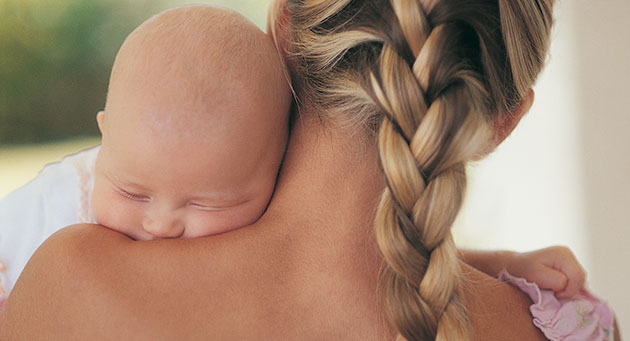
Photodisc/Thinkstock
 Photodisc/Thinkstock(NEW YORK) — For nine months, pregnant women follow strict guidelines about what to eat and what not to eat during their pregnancy.
Photodisc/Thinkstock(NEW YORK) — For nine months, pregnant women follow strict guidelines about what to eat and what not to eat during their pregnancy.
But how a new mom fuels herself in the weeks after giving birth is just as important as what she ate while carrying the baby — and medical recommendations are largely absent.
“There is no recommended American postpartum diet,” Dr. Jennifer Lang, a California-based OB-GYN, told Good Morning America. “Especially if you’re not breastfeeding, it returns to just the normal, average American dietary index recommendations.”
Lang, a mother herself, wrote an entire book, The Whole Nine Months, not just about pregnancy, but also about what experts have deemed the “fourth trimester,” or the first few weeks after giving birth.
“Food is the cornerstone of health and wellness, not only for a mother but her baby as well, both in utero and out,” she said. “Nutrition can really make a difference.”
Confinement — a period of around 30 days post-birth — is a tradition for new moms in Chinese and Indian cultures. In Chinese, the tradition is also called zuo yue zi and means “sitting the month.”
“In China, childbearing is viewed as a state that disturbs the normal balance between yin and yang,” said Elizabeth Rochin, vice president of nursing and clinical services at the Association of Women’s Health, Obstetric and Neonatal Nurses. “‘Sit the month’ is meant to restore that balance.”
In addition to restrictions on a mother’s activity during the month, women also eat foods rich in protein, calcium and iron; and warm foods such as soup.
The idea behind eating warmer foods is that they will replenish what the mother lost during childbirth, and support the healing process to bring the mother back into balance.
Eating foods such as herbs and legumes — staples of the Indian confinement diet — after giving birth may lessen women’s symptoms of postpartum depression and anxiety, a small study conducted in Singapore found.
The Indian confinement traditions include eating warm foods; avoiding fruits and “cool” vegetables such as cucumber and cabbage; increasing ghee, for strength and muscle repair; and skipping “windy” foods that may cause gas.
What science tells us
These traditions, which some women in the United States also follow, are more “culture-based than science-based,” according to Sandra Arevalo, a registered dietitian and director of nutrition and outreach community programs at Montefiore Medical Center in New York City.
Though the study on the Indian confinement diet is too small to apply to all women, most experts agree that what postpartum women eat does affect their mental well-being.
Dietary recommendations for postpartum women in the United States mostly focus on women who are breastfeeding, advising them to take in an extra 500 calories per day and drink lots of water.
Postpartum women are advised to follow the U.S. government’s 2015-2020 Dietary Guidelines for Americans, which focuses on fresh fruits, vegetables and whole grains; and getting nutrients from food instead of supplements.
A postpartum diet that’s right for you
The most common nutrition advice for new moms is this: “Eat a well-balanced diet that focuses first on vegetables and fruits followed by lean protein and whole grains and dairy,” according to Caroline West Passerrello, a dietitian and spokeswoman for the Academy of Nutrition and Dietetics.
Just like with pregnancy care, a postpartum diet should be individualized.
“If you have foods that you feel are not good for your health or gut health, you should try to limit them,” Arevalo said. “But you should never take out an entire food group from your diet.”
Women can also give themselves some grace to not worry about their weight in the “fourth trimester,” especially if they are breastfeeding.
“The focus should be on the baby getting the nutrition he/she needs to grow, not the mother’s weight,” Passerrello said.
Healing through food
It is an understatement to say that a woman’s body goes through major trauma during childbirth, whether it is vaginal or by Cesarean section.
“After a C-section, the woman is going to be in some level of pain and probably prescribed medication that can be constipating,” Lang said. “Keeping foods softer and plant-based — because of the higher fiber content — and having a lot of liquids can be lifesaving for a woman after a C-section.”
For a surgical incision, high-sugar diets impede wound healing, so foods such as candy, soda, cake and everyday foods high in sugar should be avoided, she said.
For women who had a lot of bleeding during delivery, consuming foods rich in iron and eating a high-fiber, plant-based and liquid-heavy diet can help, according to Lang.
Connection between mood, food and sleep
Focusing on a well-balanced diet can help new moms with the thing they may need most: sleep.
Skip foods high in simple sugars that are broken down quickly and cause a big insulin spike, as well as caffeine, especially later in the day, advises Lang, author of The Whole Nine Months.
“The better you are eating and the better you are sleeping, the better you’re going to feel about your body in general and new motherhood in general,” Lang said.
Passerrello called the fourth trimester a “critical time” to focus on self-care.
“Part of that self-care is acceptance and being enough and knowing there’s no perfect diet after pregnancy,” she said. “Sleep schedules are going to be off and hormones are going to be off, so it’s taking care of yourself as best you can and not being too hard on yourself.”
Nutritious snacks and small meals
While expectant moms set up the nursery for their newborn and read books on how to take care of their new baby, they should also be planning for their postpartum diet.
Stock your freezer with quick and nutritious meals; plan ahead for your new schedule; and think of quick, nutritious snacks to stock.
Eat consistently throughout the day, even if it means eating six or seven times a day because you don’t have time to sit down for meals. Consider signing up for a meal service or meal-train from family and friends.
“Don’t be afraid to step up and say, ‘I need this. I need help,'” Passerrello said.
Copyright © 2018, ABC Radio. All rights reserved.


